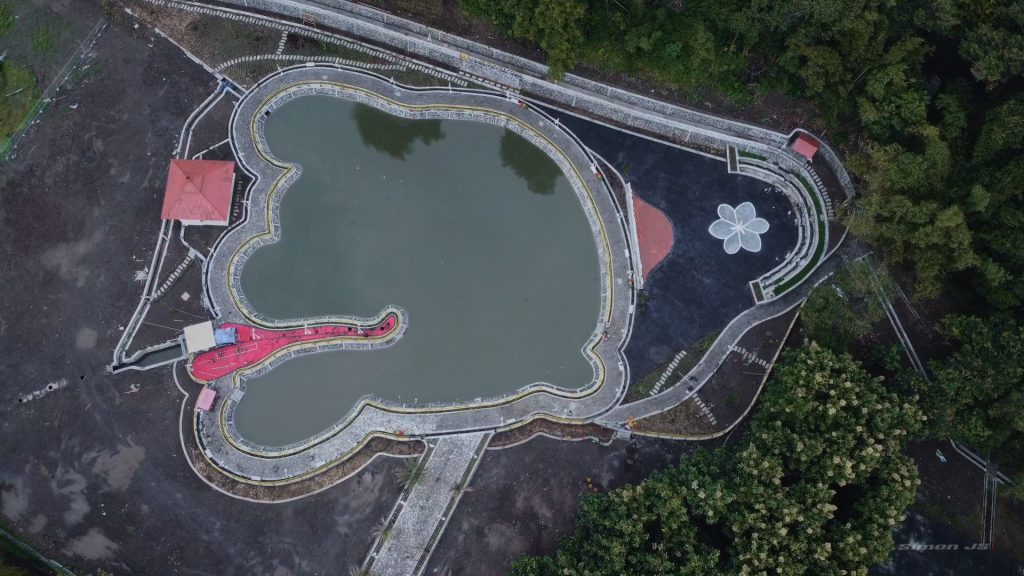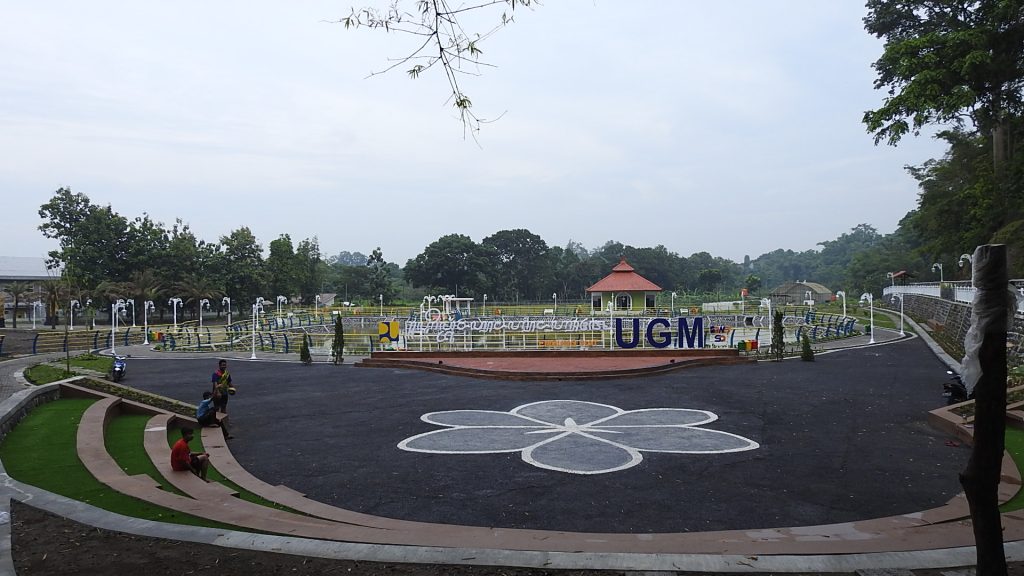
UGM SDG 6 REPORT:
ENSURING AVAILABILITY AND SUSTAINABLE MANAGEMENT OF WATER AND SANITATION FOR ALL
“SMART WATER MANAGEMENT: MEASURING USAGE AND PROMOTING SUSTAINABILITY”
Universitas Gadjah Mada (UGM) is advancing its commitment to sustainable water management through the development of a smart water management system that is accessible to the public. This innovative system detects water consumption in each building, providing detailed data on usage per hour, day, month, and year. UGM has strategically installed water meters in key locations on campus, including the PSAP, UGM Library, and PS Pariwisata, equipped with automatic water pumps and water level monitors. Facilities such as bathrooms feature Ecoflush systems, semi-automatic taps, and buoy ball taps to prevent excess water usage. By employing water-efficient appliances, UGM aims to reduce overall water consumption across the campus.
“WASTEWATER TREATMENT AND RECYCLING INITIATIVES: PROMOTING SUSTAINABILITY”
UGM has also made significant strides in wastewater treatment and recycling initiatives. The university has implemented a comprehensive procedure for managing laboratory waste, ensuring safe temporary storage and handling. Notably, the Academic Hospital and Faculty of Dentistry utilize advanced wastewater treatment systems, including IPAL, bioreactors, and biofiltration, to meet stringent environmental standards. The Bulaksumur Residence employs the Magic Tank Treatment system to recycle wastewater for garden irrigation and toilet flushing. Furthermore, several faculties have embraced greywater recycling systems and rainwater harvesting methods, as seen in the rooftop installations at Kinanti Residence and various UGM Learning Centres. These initiatives collectively reduce freshwater demand and mitigate environmental impacts.
“MONITORING WATER QUALITY: PREVENTING POLLUTION”
UGM employs thorough strategies to prevent water pollution through systematic monitoring and management. Regular water quality control is conducted for various water bodies, including the UGM Valley Lake and the upstream Code River from 2020 to 2023, with data collected on coliform counts to detect potential contamination. In 2023, UGM expanded its water quality parameters, revealing high Total Coliform and E. Coli levels, which prompted further management recommendations. Water samples from sinks and TOYAGAMA water gallons were found to meet drinking standards, demonstrating UGM’s commitment to maintaining safe and clean water on campus.
“FREE DRINKING WATER PROVISION: ENSURING ACCESSIBILITY”
UGM guarantees the provision of free, high-quality drinking water through the Toyagama Drinking Water Supply System (SPAM). With 98 water fountains and 43 water dispensers strategically located across the campus, the Toyagama system ensures that drinking water is readily available for students, faculty, and staff at no cost. The fountains and dispensers utilize ultraviolet and filtration systems to treat the water, ensuring its safety for consumption.
“IMPLEMENTING WATER-CONSCIOUS BUILDING STANDARDS”
UGM has established water-conscious building standards through detailed regulations and certifications. The UGM Rector Decree mandates guidelines for managing clean water, drinking water, wastewater, and rainwater. This ensures that buildings are equipped with proper storage and efficient wastewater disposal systems. Notable buildings, such as the Agrotropica Learning Centre and the Faculty of Biology Building B, have achieved significant water savings through EDGE Certification, reflecting UGM’s commitment to sustainability and efficient resource management.
“WATER-EFFICIENT LANDSCAPING: PROMOTING ECOLOGICAL BALANCE”
UGM is also focused on water-efficient landscaping by implementing drought-tolerant plant strategies. The Rector’s Decree on Building Code Guidelines emphasizes the importance of various vegetation types for erosion control, rainwater retention, and microclimate improvement. The Biological Forest at UGM is home to around 91 plant species, enhancing biodiversity and aesthetics. In 2023, the university planted 13 new tree species to further support biodiversity and climate change mitigation efforts.
“WATER REUSE POLICY: A COMPREHENSIVE APPROACH”
UGM has implemented a comprehensive water reuse policy that outlines clean water management and mandates rainwater harvesting systems. The policy requires separate installations for drinking water systems integrated with the campus’s Water Supply System (SPAM). Wastewater systems are designed based on hazard levels, ensuring that toxic waste is processed separately from domestic waste. Furthermore, rainwater management systems include infiltration gardens and retention ponds, which demonstrate UGM’s commitment to sustainability and ecological balance.
“COMMUNITY ENGAGEMENT: EDUCATIONAL INITIATIVES”
UGM engages in numerous educational initiatives to support local communities in water management. The Faculty of Agriculture runs a conservation program in Nawungan farmland, Imogiri, Bantul, in collaboration with local farmer groups. KKN-PPM UGM students have installed rainwater filtration systems in various communities to convert rainwater into clean water. Additionally, UGM offers training programs that promote water pollution control and sustainable water practices, empowering local communities to better manage their water resources.
“COLLABORATIVE EFFORTS FOR WATER SECURITY”
At both local and national levels, UGM collaborates with government entities to enhance water security. Collaborations with the Bapelitbang of Sikka Regency and other regional organizations focus on improving drinking water supply and urban drainage systems. Additionally, UGM partners with national ministries to promote water resource education and research, reflecting the university’s commitment to comprehensive water management strategies.
“PROMOTING WATER CONSERVATION AND COMMUNITY EMPOWERMENT”
UGM actively promotes water conservation and community empowerment through various initiatives. The university celebrates World Water Day to raise awareness and engage the community in water preservation efforts. UGM’s commitment to sustainability is further emphasized through its 2023 Circular on Electricity and Water Saving, which encourages all members of the university community to adopt water-saving practices. Furthermore, UGM’s Embung PIAT, a man-made lake, serves as a vital water conservation effort that technically function to distribute and ensure the continuity of water availability. It plays a crucial role in rainwater retention, helping to replenish groundwater resources and mitigate the impact of drought. The lake also provides a habitat for diverse aquatic life, promoting ecological balance and biodiversity.
Through these comprehensive initiatives, UGM demonstrates its commitment to achieving SDG 6: Ensure availability and sustainable management of water and sanitation for all. The university’s innovative approaches to water management, combined with its educational outreach and community engagement, illustrate its dedication to promoting sustainable water practices and ensuring equitable access to clean water for all.


Water Conservation: Embung PIAT UGM
Overall Report for SDG 1 to 17
UGM annually reports its achievements in implementing “Tri Dharma” and its contribution to society through Dies Natalis UGM, which is conducted at the end of each year by inviting all academic staff and students as well as the university’s partners. UGM also publishes a Sustainable Development Report annually.
- UGM’s SDGs Report 2023
